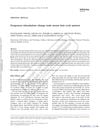 May 2023 in “Scientific Reports”
May 2023 in “Scientific Reports” The seed extract of Lepidium sativum L. can potentially treat hair loss, showing effects similar to 5% minoxidil.
 1 citations,
January 2009 in “CRC Press eBooks”
1 citations,
January 2009 in “CRC Press eBooks” Finasteride increases hair count and improves hair growth with low risk of side effects.
December 2021 in “Cureus” Minoxidil alone is the most cost-effective treatment for male hair loss at a $50,000 threshold.
 33 citations,
September 2017 in “Molecules”
33 citations,
September 2017 in “Molecules” Red ginseng oil and its components help promote hair regrowth and could treat hair loss.
 8 citations,
January 2016 in “European Journal of Plastic Surgery”
8 citations,
January 2016 in “European Journal of Plastic Surgery” PRGF treatment is safer and more effective for hair loss than topical minoxidil.
 3 citations,
October 2007 in “Expert Review of Dermatology”
3 citations,
October 2007 in “Expert Review of Dermatology” Hair ages due to various factors and treatments like minoxidil and finasteride can help, but more research and better public awareness are needed.
 12 citations,
August 2017 in “Archives of Pharmacal Research”
12 citations,
August 2017 in “Archives of Pharmacal Research” Lecithin-based microparticles can deliver minoxidil for hair growth effectively with less skin irritation.
 117 citations,
March 2017 in “Nature Communications”
117 citations,
March 2017 in “Nature Communications” Macrophages help regrow hair by activating stem cells using AKT/β-catenin and TNF.
21 citations,
January 2020 in “Pharmaceutical Biology” Salvia plebeia extract can stimulate hair growth.
 41 citations,
July 2015 in “Current Drug Discovery Technologies”
41 citations,
July 2015 in “Current Drug Discovery Technologies” Some plants may help with hair growth and have fewer side effects than synthetic drugs, but more research is needed to confirm their effectiveness.
 165 citations,
September 2001 in “Genes & development”
165 citations,
September 2001 in “Genes & development” CDP is crucial for lung and hair follicle cell development.
 19 citations,
September 2020 in “Pharmaceutics”
19 citations,
September 2020 in “Pharmaceutics” Sodium Valproate nanospanlastics could be a safe and effective treatment for Androgenic Alopecia, with fewer side effects than minoxidil.
 January 2024 in “Journal of Biosciences and Medicines”
January 2024 in “Journal of Biosciences and Medicines” Future treatments for androgenic alopecia may focus on reactivating hair follicle stem cells and improving drug delivery.
 September 2023 in “bioRxiv (Cold Spring Harbor Laboratory)”
September 2023 in “bioRxiv (Cold Spring Harbor Laboratory)” FOL-026 peptide can help repair blood vessels and promote growth, offering potential treatment for vascular diseases.
 January 2020 in “Elsevier eBooks”
January 2020 in “Elsevier eBooks” Plant-based chemicals may help hair growth and prevent hair loss but need more research to compete with current treatments.
 2 citations,
January 2023 in “Pharmaceuticals”
2 citations,
January 2023 in “Pharmaceuticals” Natural products and phytochemicals may help with hair regrowth, but more research is needed.
 2 citations,
October 2010 in “Journal of dermatological treatment”
2 citations,
October 2010 in “Journal of dermatological treatment” External treatments can change hair growth patterns in nude mice.
 3 citations,
November 1999 in “Journal of Cutaneous Medicine and Surgery”
3 citations,
November 1999 in “Journal of Cutaneous Medicine and Surgery” Examining scalp biopsies in different ways helps better diagnose hair loss types.
 1 citations,
January 2021
1 citations,
January 2021 CD4+ skin cells may be precursors to basal cell carcinoma.
 October 2024 in “Cosmoderma”
October 2024 in “Cosmoderma” Proper hair care and suitable products are essential for men's scalp health and well-being.
221 citations,
July 2012 in “Proceedings of the National Academy of Sciences of the United States of America” BMAL1 controls skin cell growth and UV damage risk, peaking at night.
 7 citations,
July 2019 in “International Journal of Molecular Sciences”
7 citations,
July 2019 in “International Journal of Molecular Sciences” PGA-4HGF may help treat hair loss by activating hair growth pathways and extending the hair growth phase.
 1 citations,
July 2020 in “Journal of cosmetic dermatology”
1 citations,
July 2020 in “Journal of cosmetic dermatology” A woman on immunosuppressants developed two rare scalp conditions, which improved with specific treatments.
 26 citations,
September 2018 in “Journal of Molecular Cell Biology”
26 citations,
September 2018 in “Journal of Molecular Cell Biology” Endoglin is crucial for proper hair growth cycles and stem cell activation in mice.
 24 citations,
January 2015 in “Evidence-based Complementary and Alternative Medicine”
24 citations,
January 2015 in “Evidence-based Complementary and Alternative Medicine” Polygonum multiflorum can promote hair growth when taken orally or applied topically.
 11 citations,
September 2012 in “Journal of animal physiology and animal nutrition”
11 citations,
September 2012 in “Journal of animal physiology and animal nutrition” Higher protein diets with DL-methionine improve mink hair growth and fur quality.
 August 2024 in “Applied Sciences”
August 2024 in “Applied Sciences” Plant extracts may help prevent or reverse hair graying.
 1 citations,
May 2017 in “InTech eBooks”
1 citations,
May 2017 in “InTech eBooks” Some natural remedies may help with hair regrowth, but more research is needed to confirm their effectiveness and safety.
2 citations,
December 2021 in “Pharmaceutics” Finasteride-loaded proniosomes effectively promote hair growth in mice.

Nanocarriers with plant extracts show promise for safe and effective hair growth treatment.


























